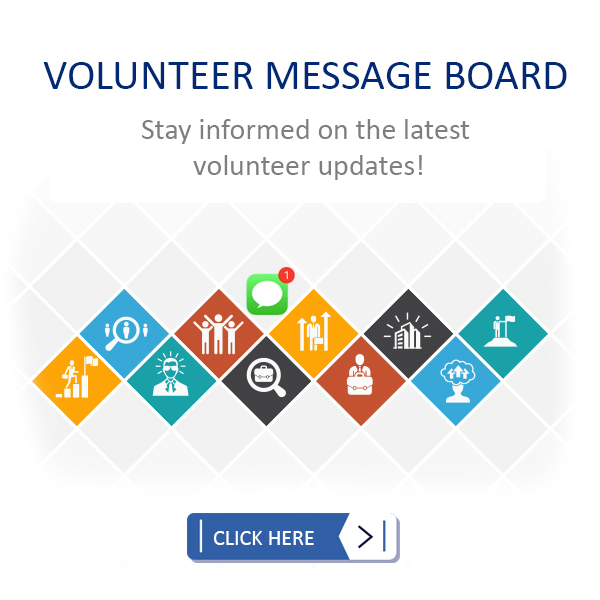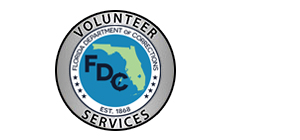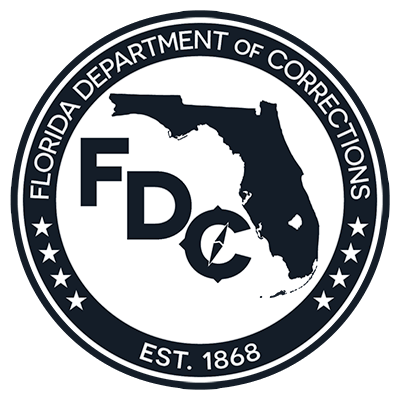Volunteers and Programs
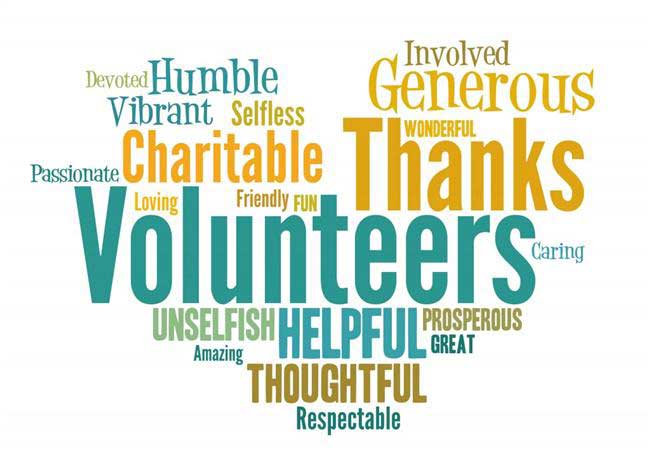
The Florida Department of Corrections has 143 facilities statewide with over 8,000 citizen volunteers working to deliver programs and provide valuable services and skills to inmates, offenders and staff. While acting as models of leadership and citizenry, volunteers provide hundreds of hours of service each year at no cost. Without these volunteers, the system could not provide the services needed for ultimate success. Volunteers also help us connect and link communities to the inmates releasing and returning to their neighborhoods. Volunteer involvement is highly valued by FDC and the Department is actively working to increase the presence of volunteers in FDC programs and services.
By bringing a variety of skills and model successful leadership and citizenship, volunteers help offenders and ex-offenders become more productive, educated, self-sufficient and law-abiding citizens. Volunteers are key players in a system designed for the development, improvement and readiness of inmates and offenders, to ensure they have a smooth transition back into the community. Volunteers are also role models for the journey and provide much needed support to FDC staff and facilities who have limited resources. It is an opportunity that provides an important public service and is also personally rewarding. The Florida Department of Corrections couldn’t do without all the help from all of the volunteers!
Learn more about how to come a volunteer for the Department?
Contact: OPR-VolunteerServices@fdc.myflorida.com
Volunteer Message Board
On our message board you will be able to find encouraging words from our Wardens throughout all our facilities, reminders, and special updates regarding our volunteers and/or volunteer online process.
Be sure to keep an eye out for all the upcoming news, recognitions and changes!
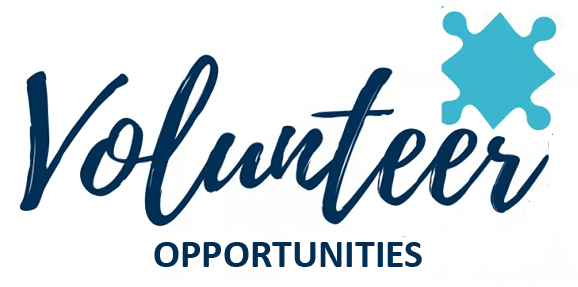
Which kind of volunteer would you like to be?
The Florida Department of Corrections has two types of volunteers; Occasional Volunteers and Regular Volunteers.
Refers to the individual performing voluntary service who has not entered a Department facility for this purpose more than five (5) times cumulatively in a one-year period and/or is a volunteer that doesn't enter our facilities on a weekly, bi-weekly, monthly basis (can be special event/program volunteers).
Refers to any person engaged in specific voluntary service activities in any Department facility or facilities on an ongoing or continuous basis, more than five (5) times annually.
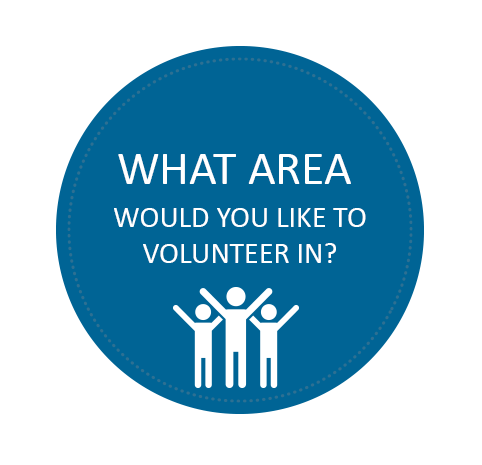
What area would you like to volunteer in?
- Are you interested in volunteering but don’t know what area of a correctional facility or community corrections that you want to volunteer in?
- There are numerous programs available for inmates/offenders where Volunteers are needed, along with their skills they can contribute. Some examples of those areas include the following:
| Volunteer Type | Volunteer Description |
|---|---|
| Academic Education | Teaching GED and TABE classes to inmates who are preparing themselves for successful readiness to re-enter society. |
| Alcoholics Anonymous/Narcotics Anonymous | Volunteer facilitators assist these groups in telling their stories and sharing accountability to change. |
| Chaplaincy | Volunteers are important to help the chaplain diversify with all the different religions and denominations that are represented within the inmate population. |
| Faith & Character Based Programs | These programs seek to unite Corrections and the Faith Community to effect an inner transformation of inmates. They last between 18 to 36 months and are open to inmates from any or no faith affiliations. Mandatory classes are faith neutral, and faith classes are all voluntary. |
| Library Services | Helping inmates/offenders use the library system, filing books and keeping resource materials in order. |
| Mentors | Mentors are used in faith and character programs, short sentence dorms, and chapel programs. A mentor is a regular service volunteer who is matched with one inmate of the same gender as the volunteer. The mentor will provide a positive role model for the inmate(s) and may continue to work with the offender after release into the community. |
| Office Helpers | These Volunteers help in an institution or Community Corrections office and assist with answering the phone, showing visitors to their room or venue, making copies, filing general paperwork, completing data entry (non-inmate/offender related) and performing other simple administrative duties. |
| Self-Betterment and Wellness Programs | These programs address the various subjects from personal development to community transition and can vary at each facility. Additionally, wellness programs, addressing topics on physical health, may also be available. These programs are designed to afford participants the opportunity to engage in activities while incarcerated and promote a healthy lifestyle and help spend free time in a positive manner. |
| Special Education | Assisting inmates under the age of 21 who have been identified as having special education needs and/or who may have been enrolled in a public-school special education program. |
| Special/Yard Events | Any event that is a religious or non-religious service or event that requires additional staff or resources, that takes place once or twice per year, within the confines of the institution. Special events should have some degree of measurable outcome; meaning there must be positive value to the inmate that can be measured either short or long term. These events can take place in the chapel area or on the yard. |
| Thinking for a Change (T4C) | Helping the Department place one instructor at each institution and Community Corrections Circuit Office to teach T4C classes which is mandatory for each inmate/offender served. This involves a commitment to training to deliver this program. |
| Transition Skills | Helping inmates who are close to their release date gather the information they need about community resources as well as employment opportunities and employability skills. |
| Tutor | The Volunteer can check homework, assist with test preparation, make suggestions about research, check the inmate/offender’s assignment list regularly, and tutor them, if materials are provided by the teacher or staff person at the facility. |
| Veterans | Assist and work with Veterans to help them in a variety of ways – seek and apply for benefits, utilize programs available to them at the facility, mentor them, etc. |
| Vocational Training | Provide inmates an opportunity to acquire vocational skills in order to obtain a job after release. |
| Youthful Offenders (YO) | Inmates meeting certain criteria may be considered youthful offenders if sentenced under the Youthful Offender Act or if such classification is determined appropriate. These inmates are housed in designated facilities as appropriate and in accordance with Florida Statute. Those facilities housing youthful offenders implement programming aimed at reducing inmate idleness and increasing young inmates’ chances of becoming law-abiding citizens upon reintegration into the community. These YO’s need mentors and Volunteers who will nurture them in a much different way than the adult inmates/offenders do. If you are up for the challenge, this is a great opportunity to use your life skills, |

Which kind of volunteer would you like to be?
To become an FDC Volunteer, each applicant must meet the following eligibility criteria according to Department Policy 503.004:
Refers to any person engaged in specific voluntary service activities in any Department facility or facilities on an ongoing or continuous basis, more than five (5) times annually.
- A volunteer must be at least eighteen (18) years of age. Underage exceptions will be considered on a case-by-case basis with approval by the Warden.
- An employee of the Department will only be allowed to serve as a volunteer in the following situations: The volunteer service does not conflict with the requirements of fair labor standards laws or place the volunteer in a professional role that conflicts with the Florida Administrative Code or Department procedures and the volunteer service is not at the employee’s work location.
- Any applicant with a previous criminal history must meet the following:
- A Volunteer applicant who was previously in prison is not eligible to serve as a Volunteer until a minimum of one year has passed since their release from an FDC facility or any other county, state, or federal correctional agency.
- Each inmate/offender will be reviewed on an individual basis and will be approved or disapproved by the approving authority the Regional Director or his/her designee.
- An individual who has received an unconditional pardon or clemency with no community supervision will not be considered an ex-inmate or ex-offender for approval as a Volunteer.
Where would you like to volunteer at?
The Florida Department of Corrections has many different Correctional Institutions and Community Corrections locations to choose from.
Look at all our locations below and visit our public website to find out more about each location in more detail:
Correctional Institutions: (Institutions -- Florida Department of Corrections (state.fl.us))
Community Corrections: Probation Services -- Florida Department of Corrections (state.fl.us))


How can I become an approved volunteer?
How to apply…
To be approved for Volunteer status, an applicant must complete an FDC Volunteer Application online using one of the following ways:
- Internet: https://apps.fdc.myflorida.com/VolunteerApplication/volunteer/create
- Email: https://apps.fdc.myflorida.com/VolunteerApplication
- Mobile App:

- If the volunteer will be registering as a “regular volunteer” (will be volunteering within the Florida Department of Corrections facilities more than five (5) times a year), the volunteer must follow the application process below:
- Submit an online application using one of the three methods listed above
- The Online Volunteer Registry will send the volunteer an email, prompting the volunteer that they must make an appointment to a Florida Department of Corrections livescan location, and be fingerprinted. List of Florida Department of Corrections livescan locations is located on volunteer public website.
- Volunteer will also need to print out the email that they received once submitting their online application to take with them to their appointment.
- After being fingerprinted, the volunteer will now wait for an email from the Department; stating that they have been cleared from their fingerprints and are ready to take their online training. Email will contain instructions on how to complete online training.
- Email Volunteer Services (as promoted on approved email) to obtain volunteer’s online training username and password for CJIS training. The online CJIS volunteer training link is provided in last email received.
- The CJIS online training consists of the following: entrance and exit procedures, volunteer manual, HIPAA, and PREA.
- Upon completion of training, the volunteer will understand the following:
- The basic organizational structure of the facility or office;
- The quality and frequency of volunteer participation that is expected based on area of expertise and availability;
- The volunteer’s work areas of responsibility and authority;
- Who to contact for information, direction, or advisement;
- Who to contact to communicate ideas and/or dissatisfactions;
- Who the volunteer is to contact to report any rule infraction or unusual incident;
- The volunteer’s expected conduct in the event of an emergency;
- Confidentiality requirement(s) for certain records and documents; and
- That the volunteers are subject to random drug testing and searches of person and property.
- Once the volunteer has completed the online training, the volunteer will need to contact the Chaplain or the Assistant Warden of Programs as the facility they are requesting to volunteer at, to obtain their PIN#, and to inquire about possible volunteering opportunities.
- If the volunteer will be registering as an “occasional volunteer” (will be volunteering within the Florida Department of Corrections facilities less than five (5) times a year), the volunteer must follow the application process below:
- Submit an online application using one of the three methods listed above
- The Online Volunteer Registry will send the volunteer an email, stating that their application has been submitted and sent off for a FCIC/NCIC background check. The volunteer will be notified via email when the results of their background check is completed.
- The volunteer will now wait will now wait for an email from the Department; stating that they have been cleared from their background check and are ready to take their online training. Email will contain instructions on how to complete online training.
- Email Volunteer Services (as promoted on approved email) to obtain volunteer’s online training username and password for CJIS training. The online CJIS volunteer training link is provided in last email received.
- The CJIS online training consists of the following: entrance and exit procedures, volunteer manual, HIPAA, and PREA.
- Upon completion of training, the volunteer will understand the following:
- The basic organizational structure of the facility or office;
- The quality and frequency of volunteer participation that is expected based on area of expertise and availability;
- The volunteer’s work areas of responsibility and authority;
- Who to contact for information, direction, or advisement;
- Who to contact to communicate ideas and/or dissatisfactions;
- Who the volunteer is to contact to report any rule infraction or unusual incident;
- The volunteer’s expected conduct in the event of an emergency;
- Confidentiality requirement(s) for certain records and documents; and
- That the volunteers are subject to random drug testing and searches of person and property.
- Once the volunteer has completed the online training, the volunteer will need to contact the Chaplain or the Assistant Warden of Programs as the facility they are requesting to volunteer at, to obtain their PIN#, and to inquire about possible volunteering opportunities.
- Volunteers may not be on the visiting list of an inmate who is housed or supervised where the volunteer is assigned;
- Volunteers may not volunteer at a facility that houses an inmate who is related to them. It is the applicant’s responsibility to report this information to his/or her supervisor immediately if this is the case;
- Volunteers providing professional services will require additional screening and approval by the approving authority to ensure the Volunteer is:
- Certified;
- Licensed; and/or
- Is otherwise qualified to provide such services.
- Visitation to assigned areas of the compound including:
- inmate housing areas (not available at all facilities);
- confinement;
- visitation park;
- work areas;
- infirmary, and
- other areas as needed.
- Checking out keys to Volunteer locations
- Supervising Volunteer activities, and/or
- Serving as a volunteer chaplain.
Will you be a “regular volunteer”?
Will you be an “occasional volunteer”?

Refers to the individual performing voluntary service who has not entered a Department facility for this purpose more than five (5) times cumulatively in a one-year period and/or is a volunteer that doesn’t enter our facilities on a weekly, bi-weekStrict security policies may cause some applicants to be denied. Some of the reasons are covered above. Applicants who are denied may yet submit an appeal to the Central Office Review Panel. This body considers the appeals of volunteer applicants who are denied and volunteers who are suspended or terminated.
A volunteer who is authorized for extended responsibilities may be required to attend more training depending on the duties assigned to her/him. Extended responsibilities may include:
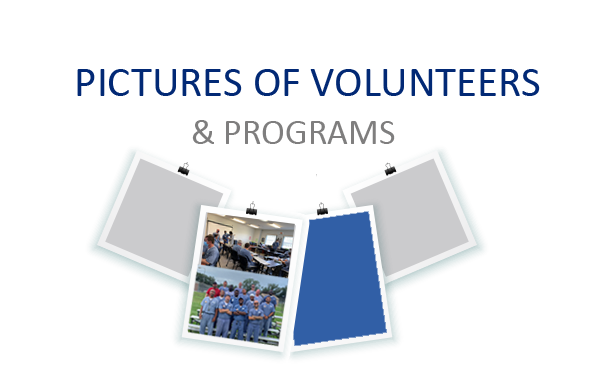
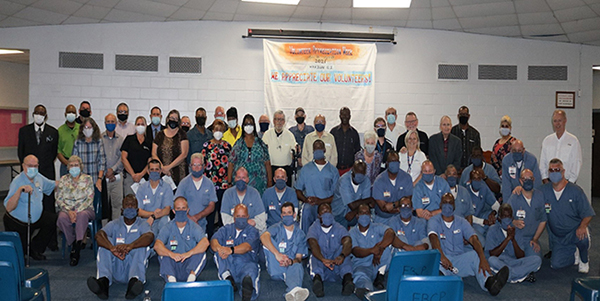
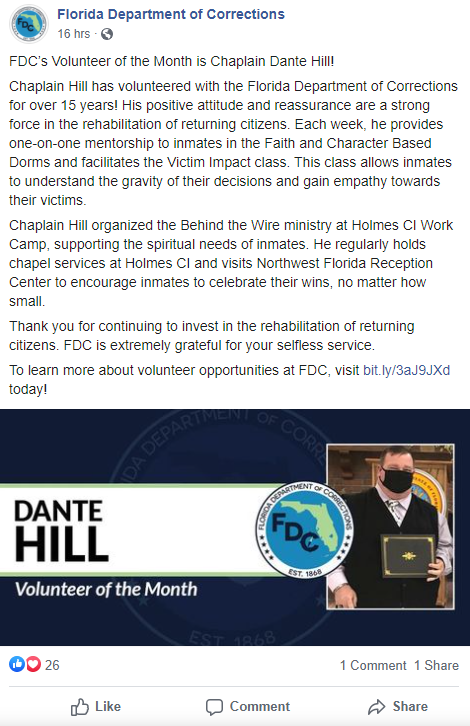
Lancaster CI would like to recognize our Volunteer of the Year, Mr. Lawrence Ciolkosz. Mr. Ciolkosz aka “LJ” selflessly devotes his time and energy to the inmates and staff at Lancaster CI on a weekly basis. LJ is a mentor in the Faith and Character Based Dorm; an instructor in the core of its curriculum, and a teacher in religious studies. LJ spends over sixteen hours of his time per month in these endeavors. LJ deserves to be recognized along with all our volunteers who help our programs function successfully.
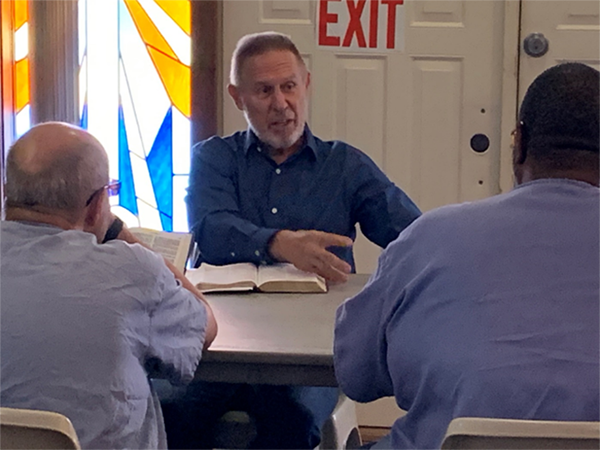
Thank you for volunteeringThank you, LJ, for your time and being a dedicated member of TEAM LANCASTER!!
Lancaster CI would like to recognize Mrs. Susanne Hoffman for her selfless service to Lancaster’s Cuffs & Collars Dog Obedience Training Program. Mrs. Hoffman has been working with and training dogs for over 40 years. Mrs. Hoffman shares her knowledge and training tips at least twice a week by working with our handlers, teaching them important skills and techniques that they in turn use to train their dogs. If any of the dogs require outside care, Mrs. Hoffman coordinates appointments with the vet and with Gilchrist County Animal Services. Mrs. Hoffman coordinates meet-and-greets and home visits with prospective adopters. Mrs. Hoffman also actively participates in every graduation with a synchronized group demonstration. Lastly, Susanne offers all the new dog owners six weeks of training – for free.
Lancaster’s basic dog obedience program would not have the success that it has had without the assistance of Mrs. Hoffman. Please help us to recognize Mrs. Hoffman for her exceptional service and dedication to FDC programs and for being a dedicated member of TEAM LANCASTER!!
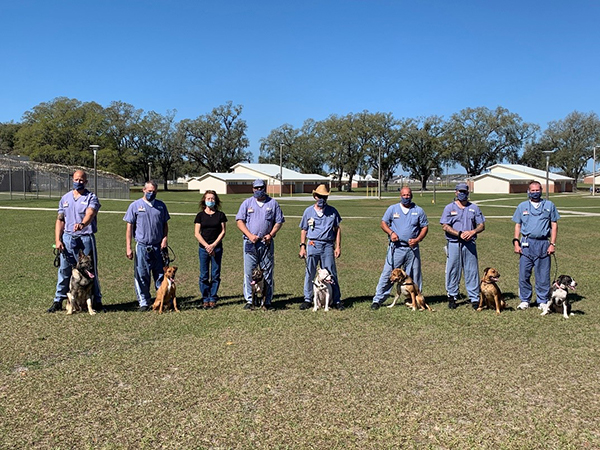
(Susanne Hoffman pictured on far right with two dogs adopted by K-9’s For Warriors)
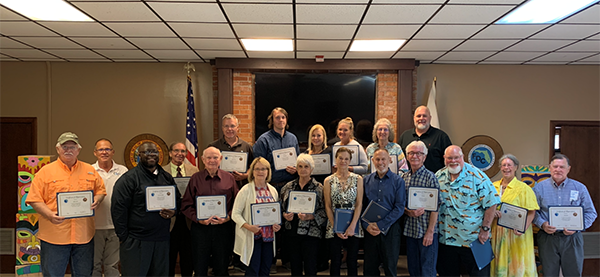
Wellness Program Completes First Class:
Congratulations to Coach Phillip James and to Lancaster CI’s wellness class. Coach James’ students successfully completed ten-weeks of high intensity physical training, followed up with physical fitness assessments.
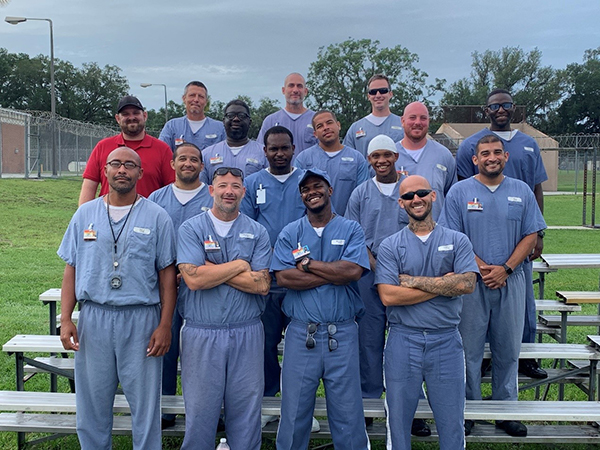
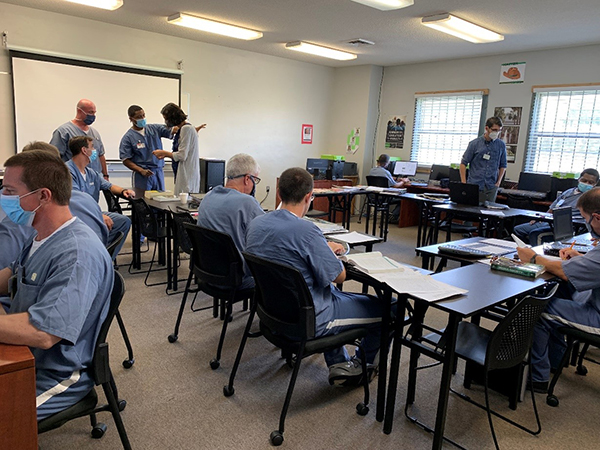
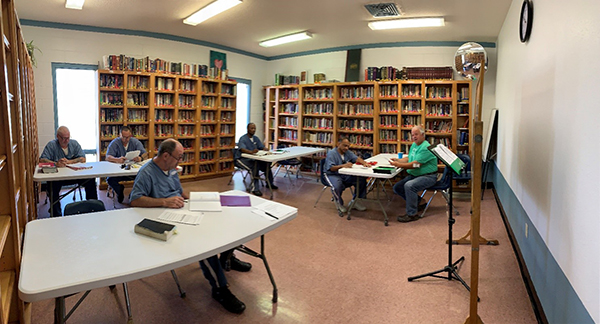
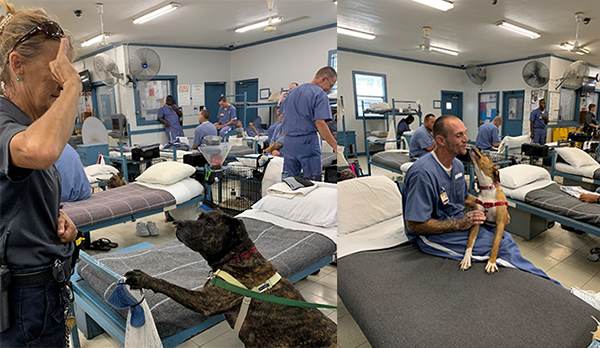
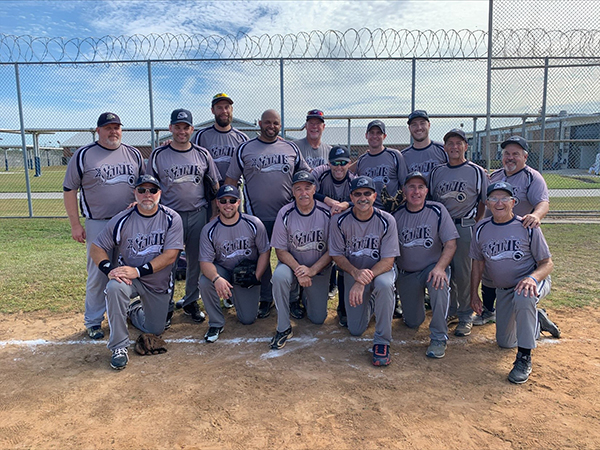
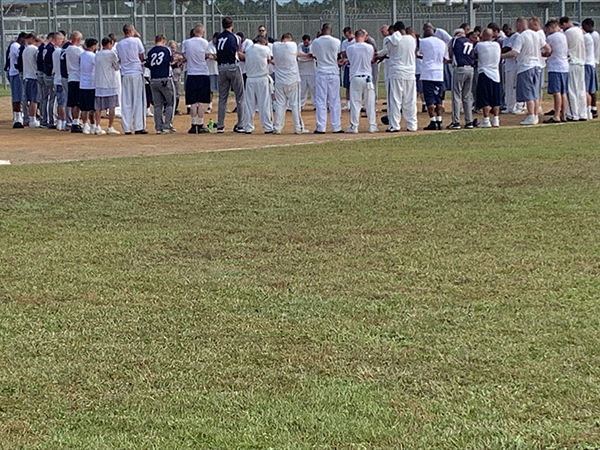
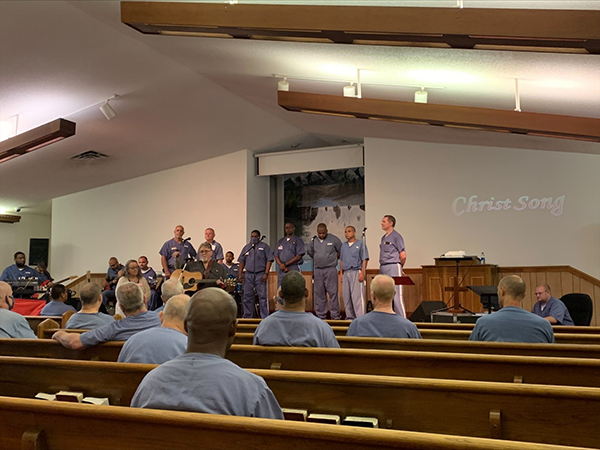
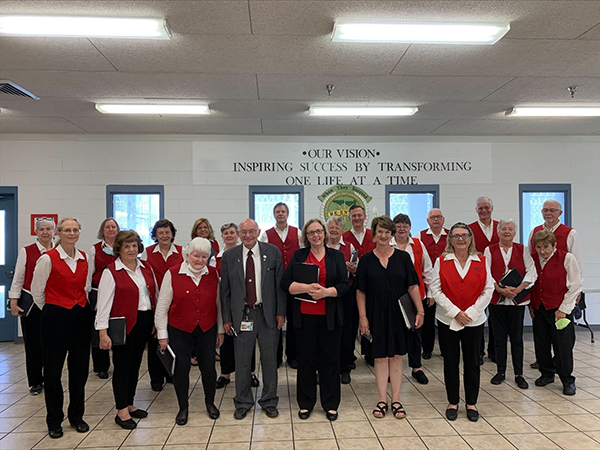

Thank you for volunteering!
Thank you for your interest in providing services to inmates in the FDC institutions and Community Corrections offices. FDC could not carry out its mission of protecting the public without the dedication of literally thousands of Florida citizens committed to inmate/offender rehabilitation and reducing crime victimization. This orientation manual should give a foundation for understanding the structure of prison life, the positive aspects of many programs and functions, as well as the potential pitfalls that must be avoided.
Whether the role is education, job training, recreation, religious programming, self-help support groups or restorative justice, a volunteer’s work will be of great importance in the lives the inmates/offenders served. When they return to communities, the information imparted, the skills taught, and the sense of purpose and belonging instilled in them will also benefit their families, neighbors, coworkers and the broader community. Volunteers also help to keep the prison facilities safer for all inmates and FDC staff.
Program success is dependent upon the ability to act professionally with inmates, offenders, and FDC staff alike; to remain security-oriented; and to hold inmates/offenders accountable for their behaviors and criminal-thinking patterns. The long-term goal of all FDC programming, after all, is to teach and role model the values of honesty, respect and integrity, in order to promote the integration of inmates into the community so they become valued and contributing members.
For any questions regarding volunteering, please email the Volunteer Services Department at:
OPR-VolunteerServices@fdc.myflorida.com
We look forward to having you volunteer with us soon!
Applying Just Got Easier!
Click Here for More Info!
Learn More About Volunteering
- Home
- Livescan Locations
- Message Board
- Special/Yard Events
- Training PDF PowerPoint for Occasional Volunteers
- Training PDF PowerPoint for Regular Volunteers
- Volunteer Application
- Volunteer Manual
- Volunteer Manual (Voluntario Manual de Capacitación)
- Volunteers and Programs
- Becoming a FDC Volunteer Checklist

